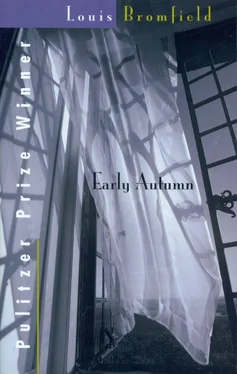If she had had any doubts or fears, she knew now that it was too late to act; she saw that it was impossible to change the wills of two such lovers as Jean and Sybil. In a way, she came to understand the story of Jean’s mother more from watching him than by listening to his long explanation. There must be in her that same determination and ardor that was in her son … a thing in its way irresistible. And yet it was difficult; she was afraid, somehow, of this unexpected thing, perhaps because it seemed vaguely like the taint of Savina Pentland.
She said, “If no one knows this, there is no reason to tell it here. It would only make unhappiness for all concerned. It is your business alone … and Sybil’s. The others have no right to interfere, even to know; but they will try, Jean … unless … you both do what you want … quickly. Sometimes I think they might do anything.”
“You mean …” he began impatiently.
Olivia fell back upon that vague hint which John Pentland had dropped to her the night before. She said, “There was once an elopement in the Pentland family.”
“You wouldn’t mind that?” he asked eagerly. “You wouldn’t be hurt … if we did it that way?”
“I shouldn’t know anything about it,” said Olivia quietly, “until it was too late to do anything.”
“It’s funny,” he said; “we’d thought of that. We’ve talked of it, only Sybil was afraid you’d want to have a big wedding and all that. …”
“No, I think it would be better not to have any wedding at all … especially under the circumstances.”
“Mrs. Callendar suggested it as the best way out. … She offered to lend us her motorcar,” he said eagerly.
“You discussed it with her and yet you didn’t speak to me?”
“Well, you see, she’s different … she and Thérèse. … They don’t belong here in Durham. Besides, she spoke of it first. She knew what was going on. She always knows. I almost think that she planned the whole thing long ago.”
Olivia, looking out of the window, saw entering the long drive the antiquated motorcar with Aunt Cassie, Miss Peavey, her flying veils and her Pekinese.
“Mrs. Struthers is coming,” she said. “We mustn’t make her suspicious. And you’d best tell me nothing of your plans and then … I shan’t be able to interfere even if I wanted to. I might change my mind … one never knows.”
He stood up and, coming over to her, took her hand and kissed it. “There’s nothing to say, Mrs. Pentland … except that you’ll be glad for what you’ve done. You needn’t worry about Sybil. … I shall make her happy. … I think I know how.”
He left her, hurrying away past the ancestors in the long hall to find Sybil, thinking all the while how odd it would seem to have a woman so young and beautiful as Mrs. Pentland for a mother-in-law. She was a charming woman (he thought in his enthusiasm), a great woman, but she was so sad, as if she had never been very happy. There was always a cloud about her.
He did not escape quickly enough, for Aunt Cassie’s sharp eyes caught a glimpse of him as he left the house in the direction of the stables. She met Olivia in the doorway, kissing her and saying, “Was that Sybil’s young man I saw leaving?”
“Yes,” said Olivia. ‘We’ve been talking about Sybil. I’ve been telling him that he mustn’t think of her as someone to marry.”
The yellow face of Aunt Cassie lighted with a smile of approval. “I’m glad, my dear, that you’re being sensible about this. I was afraid you wouldn’t be, but I didn’t like to interfere. I never believe any good comes of it, unless one is forced to. He’s not the person for Sybil. … Why, no one knows anything about him. You can’t let a girl marry like that … just anyone who comes along. Besides, Mrs. Pulsifer writes me. … You remember her, Olivia, the Mannering boy’s aunt who used to have a house in Chestnut Street. … Well, she lives in Paris now at the Hotel Continental, and she writes me she’s discovered there’s some mystery about his mother. No one seems to know much about her.”
“Why,” said Olivia, “should she write you such a thing? What made her think you’d be interested?”
“Well, Kate Pulsifer and I went to school together and we still correspond now and then. I just happened to mention the boy’s name when I was writing her about Sabine. She says, by the way, that Sabine has very queer friends in Paris and that Sabine has never so much as called on her or asked her for tea. And there’s been some new scandal about Sabine’s husband and an Italian woman. It happened in Venice.
“But he’s not her husband any longer.”
The old lady seated herself and went on pouring forth the news from Kate Pulsifer’s letter; with each word she appeared to grow stronger and stronger, less and less yellow and worn.
(“It must be,” thought Olivia, “the effect of so many calamities contained in one letter.”)
She saw now that she had acted only just in time and she was glad that she had lied, so flatly, so abruptly, without thinking why she had done it. For Mrs. Pulsifer was certain to go to the bottom of the affair, if for no other reason than to do harm to Sabine; she had once lived in a house on Chestnut Street with a bow window which swept the entrance to every house. She was one of John Pentland’s dead, who lived by watching others live.
4
From the moment she encountered Mr. Gavin on the turnpike until the tragedy which occurred two days later, life at Pentlands appeared to lose all reality for Olivia. When she thought of it long afterward, the hours became a sort of nightmare in which the old enchantment snapped and gave way to a strained sense of struggle between forces which, centering about herself, left her in the end bruised and a little broken, but secure.
The breathless heat of the sort which from time to time enveloped that corner of New England, leaving the very leaves of the trees hanging limp and wilted, again settled down over the meadows and marshes, and in the midst of the afternoon appeared the rarest of sights—the indolent Sabine stirring in the burning sun. Olivia watched her coming across the fields, protected from the blazing sun only by the frivolous yellow parasol. She came slowly, indifferently, and until she entered the cool, darkened drawing room she appeared the familiar bored Sabine; only after she greeted Olivia the difference appeared.
She said abruptly, “I’m leaving day after tomorrow,” and instead of seating herself to talk, she kept wandering restlessly about the room, examining Horace Pentland’s bibelots and turning the pages of books and magazines without seeing them.
“Why?” asked Olivia. “I thought you were staying until October.”
“No, I’m going away at once.” She turned and murmured, “I’ve hated Durham always. It’s unbearable to me now. I’m bored to death. I only came, in the first place, because I thought Thérèse ought to know her own people. But it’s no good. She’ll have none of them. I see now how like her father she is. They’re not her own people and never will be. … I don’t imagine Durham will ever see either of us again.”
Olivia smiled. “I know it’s dull here.”
“Oh, I don’t mean you, Olivia dear, or even Sybil or O’Hara, but there’s something in the air. … I’m going to Newport for two weeks and then to Biarritz for October. “Thérèse wants to go to Oxford.” She grinned sardonically. “There’s a bit of New England in her, after all … this education business. I wanted a femme du monde for a daughter and God and New England sent me a scientist who would rather wear flat heels and look through a microscope. It’s funny how children turn out.”
(“Even Thérèse and Sabine,” thought Olivia. “Even they belong to it.”)
Читать дальше












